Union Ministers of State for Health and Family Welfare, Shri Prataprao Ganpatrao Jadhav and Smt. Anupriya Singh Patel unveiled three initiatives at the आयुष्मान भारत, गुणवत्त स्वास्थ्य event here today. These initiatives will play a major role in improving the quality of healthcare services and promoting the ease of doing business in India.
The Union Ministers launched a virtual National Quality Assurance Standards (NQAS) assessment for Ayushman Arogya Mandirs (AAM); a dashboard which will help national, state and district health institutions and facilities in quickly monitoring compliance with respect to Indian Public Health Standards (IPHS) and taking actions accordingly; and a spot food licence and registration initiative for food vendors.
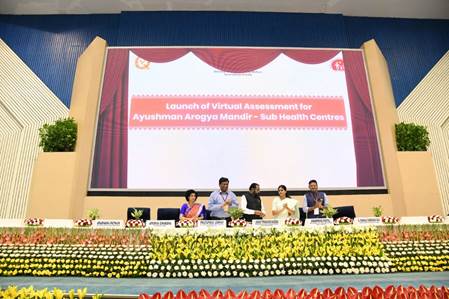
During the event, the Union Ministers conferred the virtually assessed health AAM-SC with the NQAS certificate.
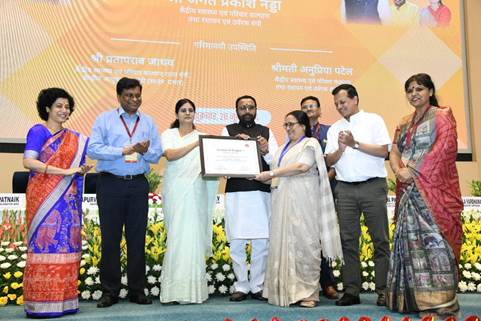
NQAS for Integrated Public Health Laboratories (IPHL) was also released during the event. The Standards will improve the quality and competence of management and testing systems in IPHLs which will positively impact the reliability of test results and help gain the trust of clinicians, patients and the public regarding lab outputs. Revised guidelines for Kayakalp was also released.
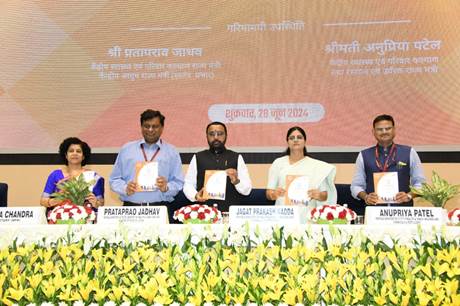
The launch of the spot food licence initiative is a ground-breaking new functionality for the instant issuance of licenses and registrations through the Food Safety and Compliance System (FoSCoS). FoSCoS is a state-of-the-art, pan-India IT platform designed to address all food safety regulatory needs. This innovative system simplifies the licensing and registration processes, offering an enhanced user experience.
Addressing the session, Shri Prataprao Jadhav said that the launch of these important initiatives is part of a continuation of the government’s effort to provide “Healthcare for All” and promote wellness. He highlighted the Union Government’s achievements in establishing over 1.73 lakh Ayushman Arogya Mandirs, doubling the number of medical colleges since 2014, increasing the number of AIIMS from 7 to 23 and more than doubling the number of PG and MBBS seats since 2014. “Government is committed to strengthening the healthcare system with more skilled human resources and quality infrastructure that can tackle both present and future medical challenges”, he stated.
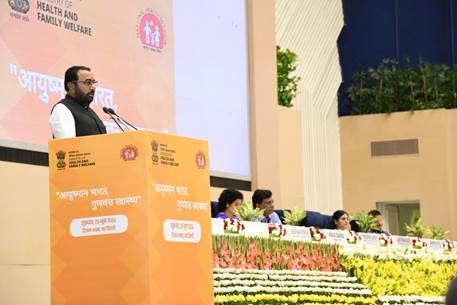
Smt. Anupriya Patel stated that the launch of the virtual NQAS assessment and dashboard as well as the release of the two documents will lead to improvement in providing quality of healthcare in public health facilities while the launch of the spot food licence will enhance the ease of doing business in India.
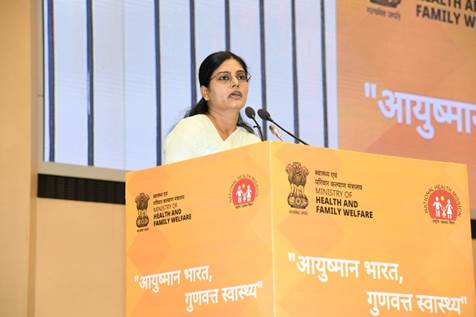
Emphasizing the “government’s focus on not only providing access to affordable healthcare but also quality healthcare”, Smt. Patel informed that the government is working hard on building a robust and quality healthcare infrastructure by 2047, in accordance with the Hon’ble Prime Minister’s vision.
Shri Apurva Chandra, Union Health Secretary highlighted the government’s continued focus on quality and providing ease of doing business for its citizens. He stated that while the Union Government incentivises states to get NQAS certification, it is also equally important to disincentivise those facilities which does not ensure the minimum standard of quality in healthcare services.
Shri G Kamala Vardhana Rao, CEO, FSSAI stated that instant issuance of licenses and registrations through FoSCoS would significantly improve the ease of doing business in India and help contribute to the Hon’ble Prime Minister’s vision of Sabka Saath, Sabka Viswas.
Earlier, healthcare workers from various health facilities all over India shared their experiences of NQAS training and the journey towards getting their facilities NQAS certified as well as the changes brought about by the certification. Food vendors from across the country also shared their experience of receiving FSSAI licence and registration for their stalls.
Background:
Virtual Assessment for Ayushman Arogya Mandir
The virtual certification of Ayushman Arogya Mandir Sub-centres (AAM-SC) represents a significant innovation in the quality assurance framework for public health facilities. Under the Ayushman Bharat scheme, initiated by Hon’ble Prime Minister Shri Narendra Modi, Ayushman Arogya Mandirs (AAM) have been established and operationalized to provide comprehensive, accessible healthcare services for all citizens. Currently, more than 170,000 Ayushman Arogya Mandirs are operational nationwide. Led by Community Health Officers, the primary healthcare teams at AAM are trained to manage initial care, triage, and refer patients to appropriate facilities for further treatment. This approach reduces the burden on secondary and tertiary care facilities by providing primary care services closer to the community with adequate referral linkages. The early identification and management of health issues help prevent disease progression, necessitating advanced care.
To ensure that every citizen receives quality health services, National Quality Assurance Standards (NQAS) were developed for District Hospitals, Community Health Centres, Rural and Urban Primary Healthcare Centres, and Ayushman Arogya Mandirs (Sub Centres) with the goal of full compliance by 2026. Online evaluations have been introduced to streamline the assessment process, involving virtual tours and interactions with patients, staff and community members. Each healthcare facility will undergo a rigorous multi-level assessment process to achieve quality certification, evaluated by MoHFW empanelled National Quality Assurance Standard Assessors.
Integrated Public Health Laboratories (IPHL)
Ensuring access to high-quality diagnostic tests is crucial for delivering life-saving treatments and effective disease prevention. Without robust laboratory services in public health facilities, patients often resort to private facilities, incurring significant out-of-pocket expenses and financial strain. Therefore, by establishing Integrated Public Health Laboratories (IPHL) the Ministry of Health and Welfare, Government of India, has strengthened laboratory systems under the PM-Ayushman Bharat Health Infrastructure Mission (PM-ABHIM). These laboratories ensure accessibility, efficiency, and quality in diagnostic services, which are fundamental to effective healthcare delivery.
The National Quality Assurance Standards (NQAS) for IPHLs has been developed to ensure consistent, precise, and safe laboratory testing processes. These standards aim to provide quality services to patients and healthcare providers, stimulate district and block-level public health laboratories to demonstrate competency, and continually maintain and improve quality standards. These standards are essential for the laboratories to adhere to for providing accurate test results, minimizing errors, and ensuring rapid, reliable, and cost-effective diagnostic services. IPHL standards are applicable to fully functional labs, located within the District Hospital or as a standalone entity. It is envisaged that the Quality Assurance team at the State and District levels will be responsible for the implementation of NQAS at the IPHL in the District.
Launch of the IPHS Dashboard for Real-time monitoring of Public Health Facilities
The launch of the IPHS Compliance Dashboard represents a revolutionary strategy in India’s healthcare development. By integrating advanced digital tools with the IPHS guidelines, the Ministry is committed to driving excellence in public health and ensuring that every individual has access to the best possible healthcare services. This initiative is a testament to the government’s unwavering dedication to improving the health and well-being of the nation.
The IPHS Dashboard is a pioneering digital platform for real-time monitoring of public health facilities that provides a comprehensive overview of the assessment and compliance status of public health facilities, including District Hospitals, Sub-District Hospitals, Community Health Centers, Primary Health Centers, and Ayushman Arogya Mandirs. By leveraging this state-of-the-art digital tool, the Ministry aims to ensure that all healthcare institutions adhere to the benchmarks set by the IPHS 2022, thereby guaranteeing the delivery of high-quality health services to every citizen.
The dashboard facilitates real-time data collection and analysis through the Open Data Kit (ODK) tool, enabling health officials to conduct thorough assessments, identify gaps, and implement necessary improvements promptly. This initiative ensures that health facilities maintain the required standards of infrastructure, equipment, and human resources, leading to better health outcomes and fostering a healthier and more equitable society.
As of June 14, 2024, over 36,730 out of 216,062 public health institutions have been assessed, with 8,562 fully compliant with IPHS standards. The goal is to make 70,000 health institutions compliant within the first 100 days of the new government’s formation.
For more information, please visit the Ministry of Health and Family Welfare’s official website.
FoSCoS:
FoSCoS is a state-of-the-art, Pan-India IT platform designed to address all food safety regulatory needs. This innovative system simplifies the licensing and registration processes, offering an enhanced user experience. Beyond licensing and registrations, FoSCoS facilitates self-compliance through online return filings, hygiene ratings for food service establishments, third-party audits for safety parameters and more. Integrated with other IT platforms of the Food Safety and Standards Authority of India (FSSAI), FoSCoS provides a comprehensive solution for food business operators.
In a significant move to further improve ease of doing business, FSSAI has introduced a new functionality that enables the instant issuance of licenses and registrations for low-risk categories of food businesses. This will be achieved through digital verification, ensuring that food safety is not compromised. This new provision supplements the existing procedures for applying and obtaining licenses and registrations as prescribed under the Food Safety and Standards (Licensing and Registration of Food Businesses) Regulation, 2011.
Currently, obtaining an FSSAI license can take 30 to 60 days from the date of submission of a complete application. For a license, it typically takes 60 days, while registration takes 7 days if no inspection is required and up to 30 days if an inspection is needed.
Instant issuance of licenses without the intervention of a licensing authority will be available for select categories such as wholesalers, distributors, retailers, transporters, storage without atmospheric control + cold, importers, food vending agencies, direct sellers and merchant-exporters. For instant grant of registration, certificates will be extended to petty food businesses applying in the same categories as mentioned above, along with petty retailers of snacks/tea shops and hawkers (itinerant/mobile food vendors). This scheme will not apply to businesses involved in high-risk food categories like milk, meat and fish.
The evolving food safety ecosystem in India is transitioning from traditional practices focused on policing food businesses to a trust-building, self-compliance regime under the Food Safety and Standards (FSS) Act, 2006. These initiatives aim to expand the food safety network by digitizing regulatory processes and providing easy access to various compliance modules, thereby enhancing the ease of doing business.
The launch of this new functionality marks a significant milestone in India’s journey towards creating a more efficient and business-friendly environment, reinforcing the government’s commitment to fostering innovation, entrepreneurship and economic growth.
Smt. Aradhana Patnaik, Addl. Secretary, Health Ministry; key stakeholders, including senior officials from the Union Health Ministry, State Governments, healthcare providers, and international health organisations attended the event.
 Matribhumi Samachar English
Matribhumi Samachar English


